Mauricio G. C. Resende
A Random-Key Optimizer for Combinatorial Optimization
Nov 06, 2024Abstract:This paper presents the Random-Key Optimizer (RKO), a versatile and efficient stochastic local search method tailored for combinatorial optimization problems. Using the random-key concept, RKO encodes solutions as vectors of random keys that are subsequently decoded into feasible solutions via problem-specific decoders. The RKO framework is able to combine a plethora of classic metaheuristics, each capable of operating independently or in parallel, with solution sharing facilitated through an elite solution pool. This modular approach allows for the adaptation of various metaheuristics, including simulated annealing, iterated local search, and greedy randomized adaptive search procedures, among others. The efficacy of the RKO framework, implemented in C++, is demonstrated through its application to three NP-hard combinatorial optimization problems: the alpha-neighborhood p-median problem, the tree of hubs location problem, and the node-capacitated graph partitioning problem. The results highlight the framework's ability to produce high-quality solutions across diverse problem domains, underscoring its potential as a robust tool for combinatorial optimization.
A random-key GRASP for combinatorial optimization
May 29, 2024Abstract:This paper proposes a problem-independent GRASP metaheuristic using the random-key optimizer (RKO) paradigm. GRASP (greedy randomized adaptive search procedure) is a metaheuristic for combinatorial optimization that repeatedly applies a semi-greedy construction procedure followed by a local search procedure. The best solution found over all iterations is returned as the solution of the GRASP. Continuous GRASP (C-GRASP) is an extension of GRASP for continuous optimization in the unit hypercube. A random-key optimizer (RKO) uses a vector of random keys to encode a solution to a combinatorial optimization problem. It uses a decoder to evaluate a solution encoded by the vector of random keys. A random-key GRASP is a C-GRASP where points in the unit hypercube are evaluated employing a decoder. We describe random key GRASP consisting of a problem-independent component and a problem-dependent decoder. As a proof of concept, the random-key GRASP is tested on five NP-hard combinatorial optimization problems: traveling salesman problem, tree of hubs location problem, Steiner triple covering problem, node capacitated graph partitioning problem, and job sequencing and tool switching problem.
Early years of Biased Random-Key Genetic Algorithms: A systematic review
May 06, 2024Abstract:This paper presents a systematic literature review and bibliometric analysis focusing on Biased Random-Key Genetic Algorithms (BRKGA). BRKGA is a metaheuristic framework that uses random-key-based chromosomes with biased, uniform, and elitist mating strategies alongside a genetic algorithm. This review encompasses around~250 papers, covering a diverse array of applications ranging from classical combinatorial optimization problems to real-world industrial scenarios, and even non-traditional applications like hyperparameter tuning in machine learning and scenario generation for two-stage problems. In summary, this study offers a comprehensive examination of the BRKGA metaheuristic and its various applications, shedding light on key areas for future research.
A biased random-key genetic algorithm with variable mutants to solve a vehicle routing problem
May 01, 2024Abstract:The paper explores the Biased Random-Key Genetic Algorithm (BRKGA) in the domain of logistics and vehicle routing. Specifically, the application of the algorithm is contextualized within the framework of the Vehicle Routing Problem with Occasional Drivers and Time Window (VRPODTW) that represents a critical challenge in contemporary delivery systems. Within this context, BRKGA emerges as an innovative solution approach to optimize routing plans, balancing cost-efficiency with operational constraints. This research introduces a new BRKGA, characterized by a variable mutant population which can vary from generation to generation, named BRKGA-VM. This novel variant was tested to solve a VRPODTW. For this purpose, an innovative specific decoder procedure was proposed and implemented. Furthermore, a hybridization of the algorithm with a Variable Neighborhood Descent (VND) algorithm has also been considered, showing an improvement of problem-solving capabilities. Computational results show a better performances in term of effectiveness over a previous version of BRKGA, denoted as MP. The improved performance of BRKGA-VM is evident from its ability to optimize solutions across a wide range of scenarios, with significant improvements observed for each type of instance considered. The analysis also reveals that VM achieves preset goals more quickly compared to MP, thanks to the increased variability induced in the mutant population which facilitates the exploration of new regions of the solution space. Furthermore, the integration of VND has shown an additional positive impact on the quality of the solutions found.
Amazon Locker Capacity Management
Dec 11, 2023Abstract:Amazon Locker is a self-service delivery or pickup location where customers can pick up packages and drop off returns. A basic first-come-first-served policy for accepting package delivery requests to lockers results in lockers becoming full with standard shipping speed (3-5 day shipping) packages, and leaving no space left for expedited packages which are mostly Next-Day or Two-Day shipping. This paper proposes a solution to the problem of determining how much locker capacity to reserve for different ship-option packages. Yield management is a much researched field with popular applications in the airline, car rental, and hotel industries. However, Amazon Locker poses a unique challenge in this field since the number of days a package will wait in a locker (package dwell time) is, in general, unknown. The proposed solution combines machine learning techniques to predict locker demand and package dwell time, and linear programming to maximize throughput in lockers. The decision variables from this optimization provide optimal capacity reservation values for different ship options. This resulted in a year-over-year increase of 9% in Locker throughput worldwide during holiday season of 2018, impacting millions of customers.
Biased Random-Key Genetic Algorithms: A Review
Dec 06, 2023Abstract:This paper is a comprehensive literature review of Biased Random-Key Genetic Algorithms (BRKGA). BRKGA is a metaheuristic that employs random-key-based chromosomes with biased, uniform, and elitist mating strategies in a genetic algorithm framework. The review encompasses over 150 papers with a wide range of applications, including classical combinatorial optimization problems, real-world industrial use cases, and non-orthodox applications such as neural network hyperparameter tuning in machine learning. Scheduling is by far the most prevalent application area in this review, followed by network design and location problems. The most frequent hybridization method employed is local search, and new features aim to increase population diversity. Overall, this survey provides a comprehensive overview of the BRKGA metaheuristic and its applications and highlights important areas for future research.
Optimization of Robot Trajectory Planning with Nature-Inspired and Hybrid Quantum Algorithms
Jun 08, 2022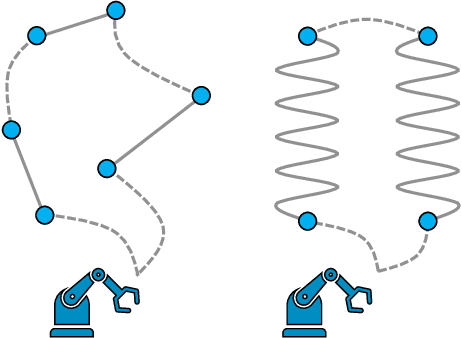
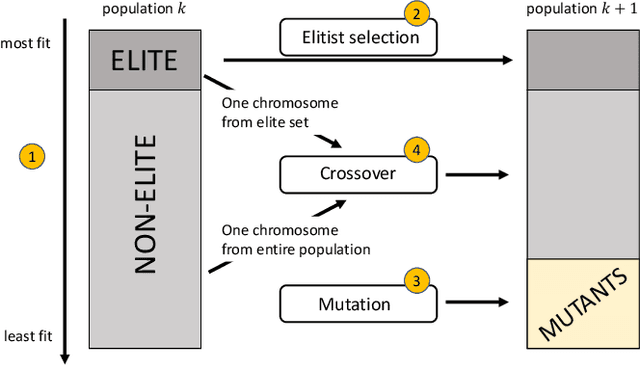
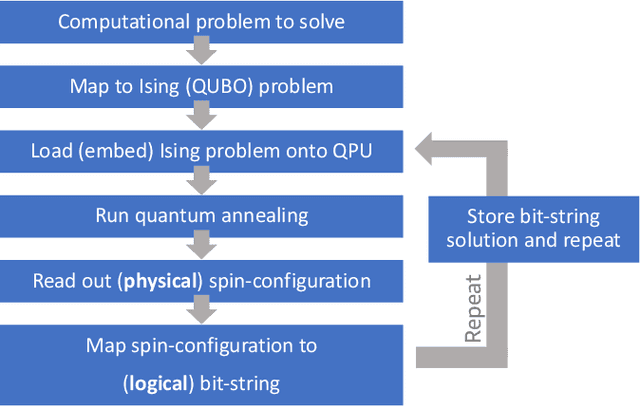
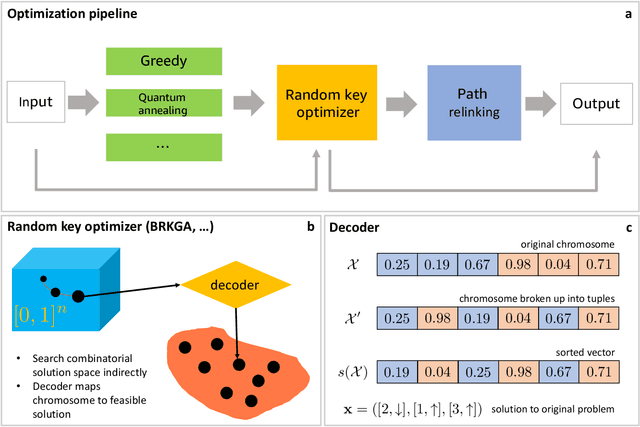
Abstract:We solve robot trajectory planning problems at industry-relevant scales. Our end-to-end solution integrates highly versatile random-key algorithms with model stacking and ensemble techniques, as well as path relinking for solution refinement. The core optimization module consists of a biased random-key genetic algorithm. Through a distinct separation of problem-independent and problem-dependent modules, we achieve an efficient problem representation, with a native encoding of constraints. We show that generalizations to alternative algorithmic paradigms such as simulated annealing are straightforward. We provide numerical benchmark results for industry-scale data sets. Our approach is found to consistently outperform greedy baseline results. To assess the capabilities of today's quantum hardware, we complement the classical approach with results obtained on quantum annealing hardware, using qbsolv on Amazon Braket. Finally, we show how the latter can be integrated into our larger pipeline, providing a quantum-ready hybrid solution to the problem.
A Metaheuristic Algorithm for Large Maximum Weight Independent Set Problems
Mar 28, 2022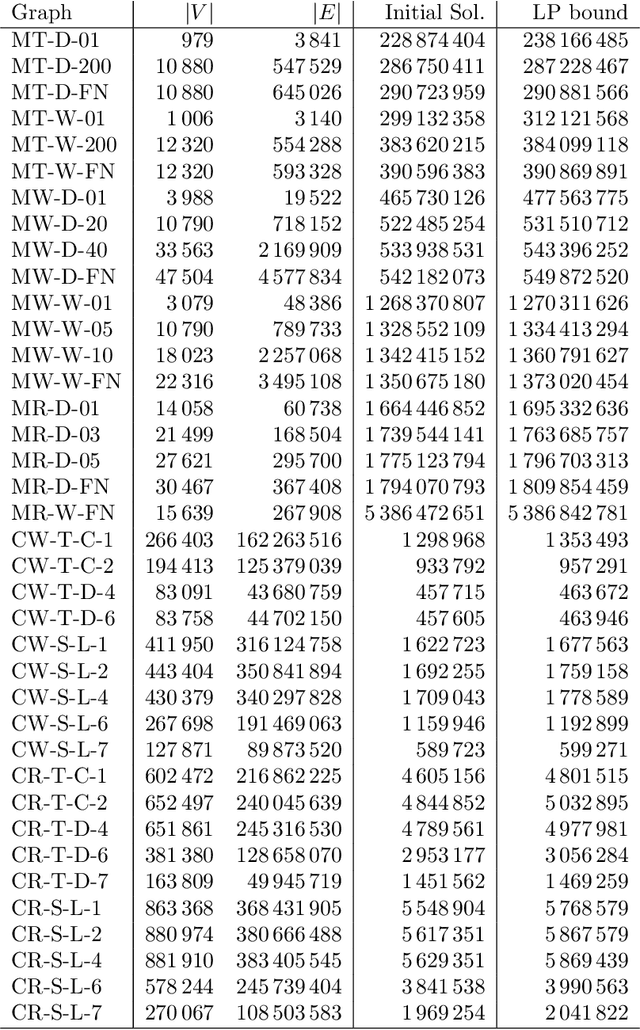
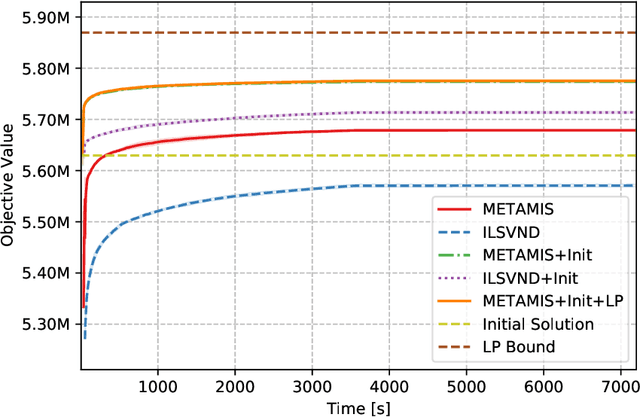
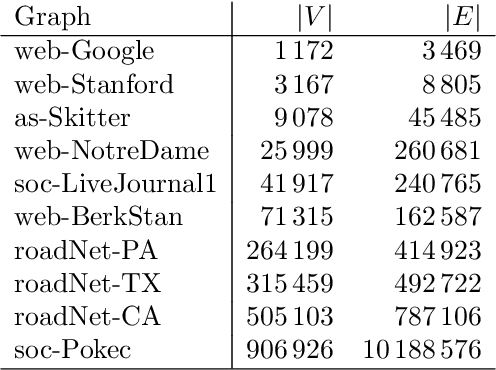
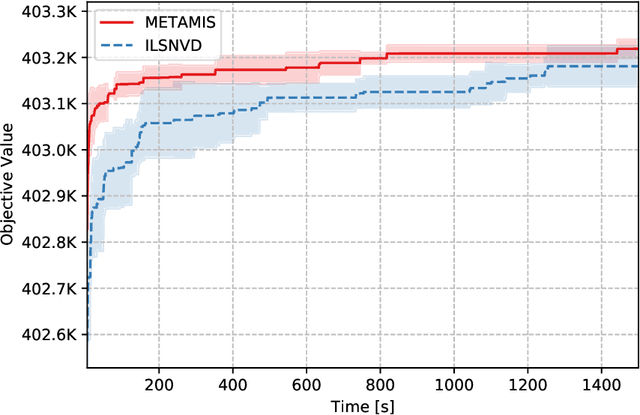
Abstract:Motivated by a real-world vehicle routing application, we consider the maximum-weight independent set problem: Given a node-weighted graph, find a set of independent (mutually nonadjacent) nodes whose node-weight sum is maximum. Some of the graphs airsing in this application are large, having hundreds of thousands of nodes and hundreds of millions of edges. To solve instances of this size, we develop a new local search algorithm, which is a metaheuristic in the greedy randomized adaptive search (GRASP) framework. This algorithm, which we call METAMIS, uses a wider range of simple local search operations than previously described in the literature. We introduce data structures that make these operations efficient. A new variant of path-relinking is introduced to escape local optima and so is a new alternating augmenting-path local search move that improves algorithm performance. We compare an implementation of our algorithm with a state-of-the-art openly available code on public benchmark sets, including some large instances with hundreds of millions of vertices. Our algorithm is, in general, competitive and outperforms this openly available code on large vehicle routing instances. We hope that our results will lead to even better MWIS algorithms.
 Add to Chrome
Add to Chrome Add to Firefox
Add to Firefox Add to Edge
Add to Edge